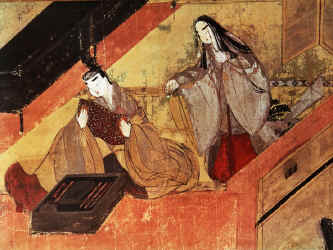It is
generally believed that Japan was founded in 660
BC, with the first emperor, Jimmu. After
ascending the throne and ruling over Kyushu,
Emperor Jimmu expanded his empire northward to
Yamato. During this time, Korea's
influence on Japan's culture was considerable.
Korea had made great strides in their culture,
significantly influenced by China, and these
influences were passed on to Japan.
By the 5th
century with the help of the Paekche kingdom in
Korea, Chinese writings were beginning to be
used in court and around 430, historiographers
were appointed in an effort to keep accurate
records. Buddhism, along with its priests,
images, scriptures, etc., was brought to Japan
during this time from Korea as well, which made
a noteworthy impact on Japan. Although the
relationship between Korea and Japan was
weakening, Buddhism was firmly entrenched in
Japan's culture, with it becoming the national
religion by the 7th century.
Back
to Top
Using
China's centralized government as a model, Japan
drafted their first constitution, which
established court officials on a hierarchy.
In 710, Nara became the capital and in 794 the
imperial residence was moved to Kyoto and
remained the capital until 1868.
The 9th
century brought about change with the emperors
becoming private, disappearing from public life,
and leaving governmental affairs with those
under them. It was during this time that
the Fujiwara, the main aristocratic family,
essentially became the leaders of Japan.
In 858 they took power and kept it for three
centuries. The period under Michinaga,
considered to be the supreme Fujiwara leader, is
considered to be Japanese literature's
"classical age." It also
brought about a change from centralized
government to one of dividing up the country
into great estates.
Initially
joining together for protection, warriors from
the Taira and the Minamoto clans eventually
gained recognition for the military abilities
(the Taira in the southwest and the Minamoto in
the east). When these clans started
broaden their power to the court, a power
struggle began. After two wars, the first
in 1156 and the second in 1159-60, the Minamoto
were defeated by the Taira who then took control
from the Fujiwara. In 1180, the same year
the Taira leader's infant son became emperor,
the Minamoto's led an revolt that sent the Taira
out of the capital. The war ended in 1185
and Yorimoto, the Minamoto leader, became
Japan's leader.
One of the
things Yorimoto did was create a separation of
the military from the government and established
a military capital in Kamakura in 1185. It
was also during this time that feudalism grew
stronger until it surpassed that of the imperial
organization. When Yorimoto was appointed
to the position of "shogun" (Seitaishogun),
it further crystallized his power in Japan,
superceding that of the emperor and his court.
The
Minamoto clan was eliminated by the Hojo family,
who then became the military rulers of Japan in
1219. The Hojo's had the emperor appoint
shoguns, thus allowing the Hojo's to have all
the power as regents. The Hojo's never
became shoguns, in spite of this they kept their
power for over one hundred years.
Back
to Top
Other
Related Sites...
Information
provided by the Japanese Embassy







